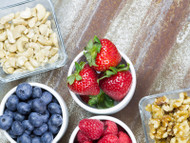If you’ve ever experienced after-school grumpiness or an unfocused homework session, you’ve seen your child’s brain calling out for help. Most children need a healthy snack after a long day, but sugary snacks won’t do the trick. Like adults, children need the power of brain food: healthy snacks that are rich in omega-3 fatty acids[1], antioxidants, and protein.
Refuel your nine-year-old the smart way with power snacks that help their brains learn and grow.
Hydrate with Fruit Infusions
The best after-school beverage for kids is water, plain and simple. Most kids (like us adults!) don’t get enough water during the day so it’s key to help them hydrate once they get home. A well-hydrated brain is ready to take on homework, reading, or an extra play session.
Some children love pure water, but if your child is picky or prefers sugary sodas, help them learn to love water by making fruit infusions. Fruit infusions are fun and simple ways to add flavour to water while keeping it healthy. Slice strawberries, kiwi, orange, lime, or any of your child’s favourite fruits and add to fresh water. Leave to infuse for an hour or two or enjoy right away.
Have Fun with Dips
Many children love to dip their foods, so this is a great way to add in some brain-boosting power. Hummus[2] boasts tons of protein and vitamins and can be made with additional healthy veggies like spinach, red bell peppers, turmeric, or crushed walnuts.
Healthy Fats
When it comes to brain power, healthy fats are key. Kids, however, may shy away from foods rich in healthy fats like fish, nuts, seeds, and avocados. If so, try making smoothies with Greek yogurt, sunflower seed butter and jam sandwiches, or hard-boiled eggs for after school snacking. Pumpkin and sunflower seeds are a great source of brain energy for children and make a great trail mix (feel free to add dried fruits, other nuts, or small chocolate chips). Keep this ready to go for brain fog emergencies.
Written by Kaitlan D.
As well as a writer with a passion for education, Kaitlan works in a wellness practice, working with mothers, mothers-to-be and hopeful mothers.
References
[1] Derbyshire E. Do Omega-3/6 Fatty Acids Have a Therapeutic Role in Children and Young People with ADHD? 2017-08-30
[2] WebMD. Hummus: The Healthy Dip. 2020
All articles are provided as general information and are not intended, nor may it be construed, as medical advice or instruction. Information and opinions expressed are believed to be correct and accurate to the best knowledge and judgement of the authors. Readers should consult their appropriately qualified health care professional prior to taking any action or inaction.

